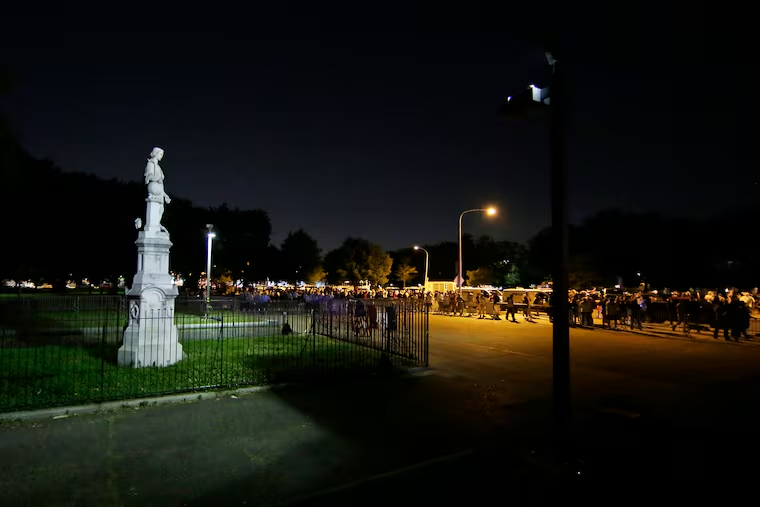Marconi Plaza brawlers don’t represent all Italian people in South Philly | Opinion
What happened at Marconi Plaza was traumatic, and some bad actors have tarnished the community’s image and reinforced negative stereotypes.

Italian immigrants and their descendants have had enormous impacts on the culture and fabric of South Philadelphia, and the city as a whole. Today, Italian restaurants sit on the same streets as taquerias and Vietnamese bakeries. At our best, we are welcoming people looking to live, work, and play in peace.
That’s why we, three Italian Americans who make their home in South Philly, are angry and frustrated about the conflict, confrontations, and controversies surrounding the statue of Christopher Columbus in Marconi Plaza, including Tuesday night’s tense events, with some men bearing bats and hammers, purporting to warn against vandalism or removal of the statue of Columbus that looks over South Broad Street.
Columbus has been a symbol of Italian pride, and of our contribution to the birth and growth of the United States. In 1892, President Benjamin Harrison proclaimed Columbus Day as a one-time national celebration to placate Italian Americans, immigrants, and Italy’s government after a mass lynching of 11 Sicilians in New Orleans.
In the years that followed, Italians were subject to prejudices similar to some of those for which marginalized groups seek redress, including the use of legislation to halt our mass immigration, the internment of some unnaturalized Italians in camps during World War II, and the redlining of our neighborhoods. We have been often stereotyped, ridiculed, and, perhaps worst of all, ignored.
Other groups, especially African and Native Americans, fared worse and continue to suffer from systematic oppression. Italians cannot and should not equate the treatment of our kin to the suffering of these other groups. Despite Italians’ notably widespread assimilation, our history does not allow us to turn a blind eye to injustice or prejudice. In fact, we have a duty to help redress those wrongs.
What happened at Marconi Plaza was traumatic, and some bad actors have tarnished the community’s image and reinforced negative stereotypes. We do appreciate those who went to Marconi with the intent to peacefully exercise their First Amendment right to speak. We strongly condemn any violence or intimidation of protesters, counterprotesters, bystanders, or journalists. This is unacceptable, contrary to the values of most South Philadelphians, and detrimental to the neighborhood.
Mayor Jim Kenney said in a statement Wednesday the city will ask the Art Commission on July 22 to approve the statue’s removal “in light of ongoing public safety concerns about the presence of armed individuals at Marconi Plaza.” This opens discussion about what, if anything, will replace it. This debate will create anger and resentment if not approached with respect, caution, and the spirit of good faith.
The process is already off to an inauspicious start. While some in the community wanted a more representative monument and some wanted to keep the statue, reasonable community members on either side had hoped for a more deliberate, thoughtful, and transparent process.
This was an opportunity to communicate and educate. Many neighbors believe the Kenney administration sought and found an “out” for a tense situation (made so by the unfortunate behavior of some), and never truly intended to consider the opinions, thoughts, and ideas of South Philadelphians. This creates cynicism and doubt about what voice, if any, neighbors will have in determining a suitable, representative replacement.
South Philadelphians of Italian heritage should be given the opportunity to embrace our role in the development and history of this city, educate both our kinfolk and our neighbors about the history and merit of our community, and offer an olive branch to others who, like us, have suffered exclusion, derision, and prejudice.
We must also hear those who believe that Columbus represents something entirely different to them than it does to some (though not all) Italian Americans, including pain, suffering, systematic oppression, and the loss of land, culture, and lives. This is his legacy to many Americans, especially Native Americans, and also some members of our own community. There must be another symbol, one that reaffirms our presence and contribution to this city and country, but does not aggravate the open wounds of our fellow citizens.
Most importantly, we must show leadership. Italian American or not, South Philadelphia has produced some of Philadelphia’s most important citizens, figures who have brought positive attention to not only South Philadelphia, but the entire city and country. We must now take the mantle and peacefully engage.
Gaetano P. Piccirilli, Francis Cratil Cretarola, and David A. Magaldi Jr. are Italian American South Philadelphia residents and advocates.